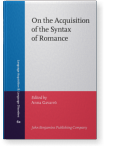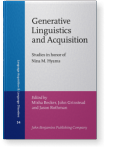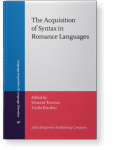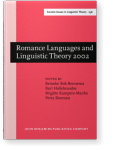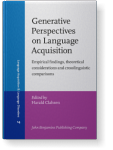Kenneth Wexler
List of John Benjamins publications for which Kenneth Wexler plays a role.
2018 The acquisition of Spanish: The comparison between subject experiencer passives versus actional verbs and direct aspectual semantic evidence for the adjectival interpretation On the Acquisition of the Syntax of Romance, Gavarró, Anna (ed.), pp. 57–90 | Chapter
We test the maturational/adjectival analysis theory of development of passives in Spanish. Children perform less well on psychological passives than on actional passives. Since Borer and Wexler (1987), the most prominent hypothesis is that this difference is due to children’s use of an adjectival… read more
2013 A new theory of null-subjects of finite verbs in young children: Information-structure meets phasal computation Generative Linguistics and Acquisition: Studies in honor of Nina M. Hyams, Becker, Misha, John Grinstead and Jason Rothman (eds.), pp. 325–356 | Article
This paper proposes a new theory of why null-subjects of finite verbs are produced by young children developing a non-null-subject language. We first show that one of the extant theories, Topic-Drop, isn’t supported. Modifying ideas proposed in Rizzi (2006), we assume that finite null-subjects… read more
2006 The acquisition of experiencers in Spanish L1 and the external argument requirement hypothesis The Acquisition of Syntax in Romance Languages, Torrens, Vincent and Linda Escobar (eds.), pp. 183–202 | Article
We present evidence that children have difficulty with the Spanish psych verbs that do not project the subject as the external argument. Our findings support the External Argument Requirement Hypothesis (EARH), according to which children until 5 or more have trouble with base structures that don’t… read more
2004 Feature Checking and Object Clitic Omission in Child Catalan and Spanish Romance Languages and Linguistic Theory 2002: Selected papers from ‘Going Romance’, Groningen, 28–30 November 2002, Bok-Bennema, Reineke, Bart Hollebrandse, Brigitte Kampers-Manhe and Petra Sleeman (eds.), pp. 253–268 | Article
